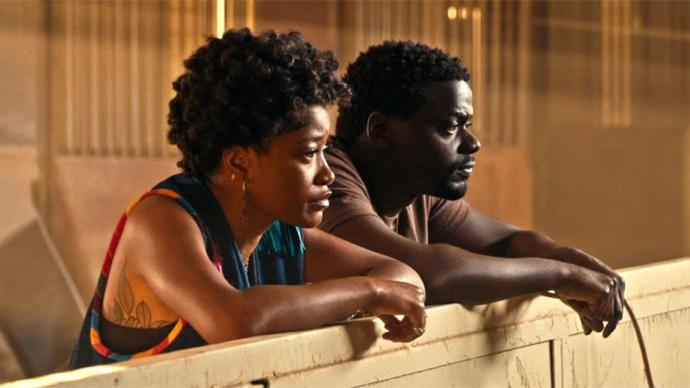
Jordan Peele's new Nope has a finely crafted book full of references, metaphors and tributes. The main characters are "people of color", terrestrial animals and alien animals, and the location is located in the Hollywood Haywood Ranch and the adjacent Carnival theme park in California, USA.
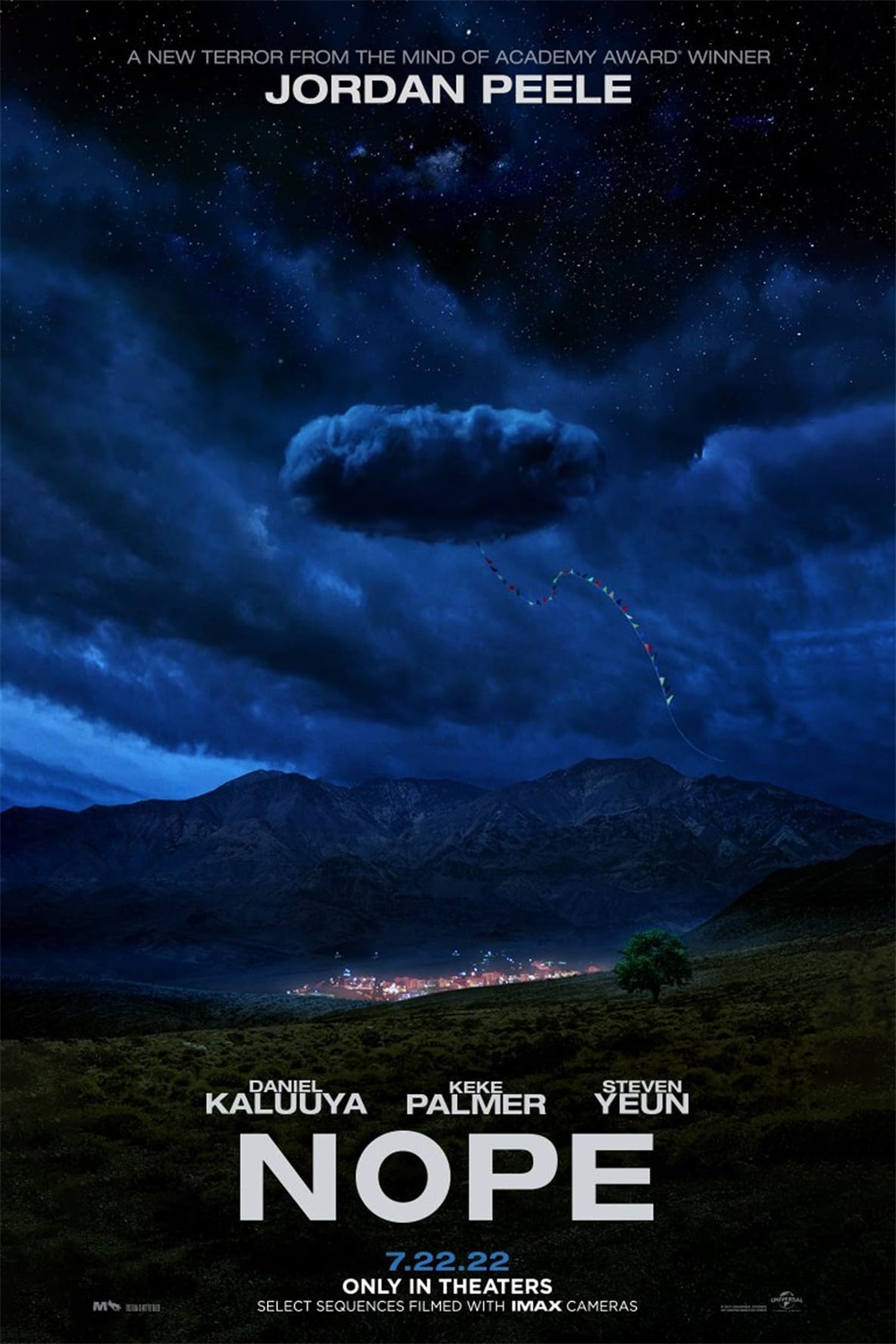
"No" poster
Alien animals hide behind clouds, forming the spectacle of the only immobile cloud above the western mountains, waiting to be discovered. The setting of this monster is similar to Cthulhu. It hides into nature when it is not moving, and devours everything when it moves, creating fears that humans cannot understand and cannot describe. But as the plot progressed, it was cast aside. Haywood Ranch's OJ (Daniel Kaluuya) realizes that the monster on the cloud isn't an alien flying saucer, it's an alien animal. With his experience working with horses and animals from a young age, he found a way to avoid being devoured: Don't look the monster in the eye.
Later he even named the monster after a horse, calling it Jean Jacket. In this way, a connection is established between the people and the God of Chaos. In many folk beliefs, gods do not have names, or have names but must never be known. OJ is far from the time of the original belief, and he gave it a name without any psychological burden, making it no longer a cloud thing. Once Cthulhu can be mentioned and discussed, it means it can be watched, filmed and even defeated.
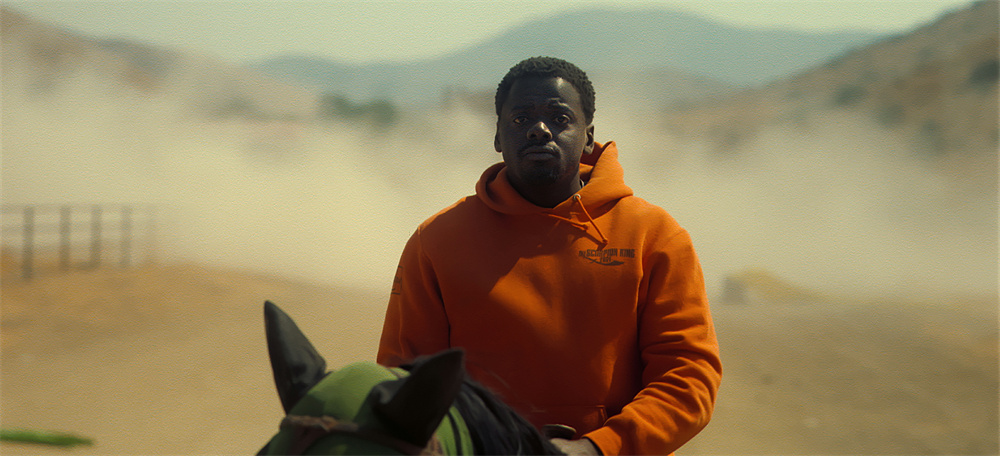
"No" stills
If placed in ancient times, this alien creature would have been worshipped as a god. It is incomparably powerful, and elusive, and it will take a while to fill its stomach, just like the gods in nature worship who need to be wooed and appeased.
But it came at a time when God no longer believed. Not a single character in the film mentions "God Punishment" or any speculation about God. As soon as it appeared, people started figuring out how to use it. Apart from the fear of being eaten, none of the humans in the film show any reverence for the creature. No word of mouth whispered, no kneeling begging for God's help, no doubt about it or the incarnation of Satan, bringing about the end of mankind. Only zealously making battle plans, shouting through walkie-talkies, and speeding across the desert on horses and motorcycles. In California in the 21st century, Christianity and paganism have all declined. Traffic, fame, and sudden wealth are the new religions that control the hearts of believers through visual wonders.
"Spectacle" appears in the opening credits, "...and make you a spectacle," from Nahum, chapter three, verse 6 (3:6) of the Old Testament, and the documentary "We don't deserve a spectacle like this," says photographer Horst (Michael Wicker) before he dies.
A spectacle is a spectacle because it is rare, unpredictable, and cannot be created and controlled by human beings. The development of science and technology and the growth of human self-confidence have given us a new way of coping with spectacles - photographing it, showing it to more people, and exchanging luck and courage for what we want.
Wonders are becoming more and more accessible. Everyone wants to photograph spectacles, and everything can be materialized in the name of "spectacles" and become objects to be photographed and watched. In order to be the first person to photograph the spectacle, everyone put their life and death aside like the people on the gossip website in the film. At the moment, they only have one idea: to take pictures of tall buildings on cliffs, floods and beasts, trains approaching, disasters falling from the sky... There is an endless stream of people who have died for this. The absurd is that even eating can be turned into a "spectacle". As long as you keep eating and decide who is the big stomach king, you can also attract traffic. People who are fascinated by the "Wonder" become its loyal believers until they sacrifice themselves to the "Wonder".
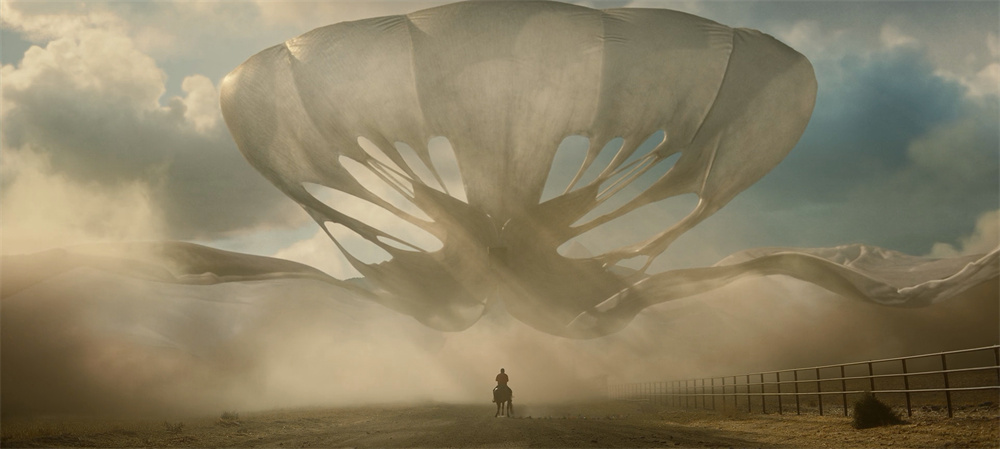
"No" stills
Because filming this action is so convenient, it changes the way new humans see and perceive the world. If you take out your phone in advance, just press the record button and you can breathe a sigh of relief. It is no longer necessary to mobilize all the senses to ingest information, perceive the environment, and record the situation at that time. Humans who use machines to record will empty themselves and become unknowing and unconscious beings. At the end of the film, OJ's younger sister, Xiao Fei (Koke Palmer), vividly demonstrates this modern psychological state, which makes people smile.
The problem with this is that not many people will re-view the captured footage. The vast majority of fleeting moments turned into digital images will never be viewed again. Even if it is rewatched, it is difficult for the viewer to evoke the full feeling of being there through the image due to the absent-mindedness at the time of recording. Instead of a panoramic immersive experience, machine recordings and absent-minded viewing acts like an eraser, wiping away chapter after chapter of our lives.
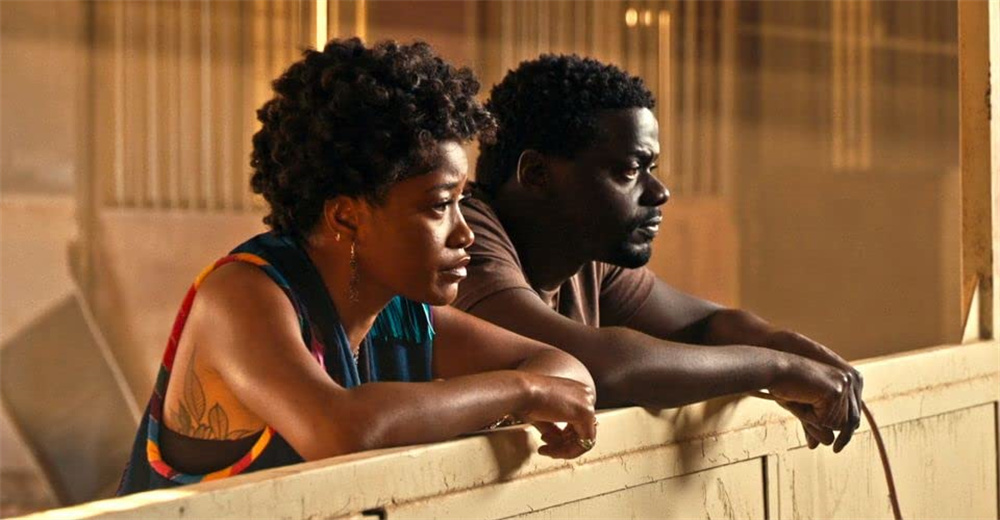
"No" stills
While there is still a lot of race-related content in No, Jordan Peele has moved past this topic into new realms of seeing and refusing to be seen, objectifying and refusing to be objectified. This is a more universal field, regardless of skin color, nationality and gender, as long as you use your mobile phone and social network, you are his target audience.
Chimpanzees, horses, and alien creatures in sitcoms are not treated like living animals by humans. They are materialized into something that can be used for profit. Domestication drains their animal souls and becomes human slaves and tools. "Gordy" kills all directions, the horses run away, disappear and refuse to cooperate, and alien creatures eat creatures that dare to watch it, all of which are their way of resisting being materialized.
Old Heywood said: "Some animals cannot be domesticated." OJ remembered what his father said, and contacted the horse's dislike of looking straight in the eyes, and extraterrestrial creatures, and then came up with a good plan to let them escape. At the moment of danger, he resisted the urge to look up at it, told himself "Nope", bowed his head, backed into the car, and escaped.
People can't understand why tame chimpanzees go mad, because they don't know that domesticated animals still retain their last dignity. Not only do aliens and horses attack when stared in the eye, but domestic cats do the same, turning their heads away (good cats don't hit people). At this time, people can escape the deadly attack of the beast as long as they lower their eyes, bow their heads, and lower their posture. But not many people know this.
Our lack of respect today is all-encompassing. Not just living things, but inanimate objects also have something to be feared about. Rugby players will tell you to respect the trajectory of the ball. With humility and respect for the characteristics and physical laws of an object, just as surfing respects the laws of waves, it is possible to understand and control that object.
If you don't learn your lesson and only think about taking advantage of others, you'll end up as miserable as Ricky (Steven Yeun), a former child star who runs a theme park. In the flashback, the director explained his past. Ricky was a young actor in a popular sitcom that year. During a performance, the chimpanzee who played "Gordy" suddenly went crazy and attacked all the cast members at the scene. He hid under the table and heard the tragedy. After killing everyone, the chimpanzee came to the table. Due to a layer of tablecloth, the young actor did not look at the chimpanzee. At this point "Gordy" held out his fist at him, showing that it had recovered its sanity, remembering the movements taught to it by humans. Ricky stretched out his fist too. Before the two fists collided, the chimpanzee was killed.
As an adult, Ricky incorporated this "movie history classic" into the theme park and sold it to fans of the show as a bonus for an extra fee. He had long forgotten the lesson of not looking at dangerous beasts, and instead learned another lesson from it—how to use spectacle. After the aliens came here, Ricky soon discovered. He probably looked up to the sky a lot, thinking about how to make money. Unlike OJ, who has everything going wrong, spends his days with endless work on the farm.
Ricky should not be seen as a simple villain. He is adventurous and imaginative, has a strong desire to make money and become famous, and is also very intelligent. After discovering that the alien creature is a hunter, he keeps buying horses from OJ, using the horse as bait to try to domesticate the alien creature and make money by showing the wonders. If he hadn't underestimated the other party's appetite, maybe Ricky would have succeeded in one fell swoop and returned to the Hollywood studio to resume his career as a movie star.
Other characters are just as willing to take risks as Ricky, with a sense that the greater the danger, the greater the reward. Xiao Fei wants to use the images of alien creatures for a pass to the Oprah show, opening the door to actors, singers, and dancers. Angel (Brandon Pella), a brother in an electrical store, wants to satisfy his curiosity about alien creatures and conspiracy theories, and wash away the pain of lovelorn and mediocre life. Photographer Horst wanted to capture the "real guy" as the best legacy of his life in the world of photography.
Only OJ is not quite like them. He is one of the least enthusiastic about photographing alien creatures. Satisfying his sister's wishes and his own curiosity made him a little shaken. He is also really hard to ride a tiger, and the existence of alien creatures puts his farm in danger. If you don't do anything, it will be the end. If you do something, you may have a chance. A variety of reasons were mixed together, which prompted him to decide to join the "shooting monsters" operation of the four-member group.
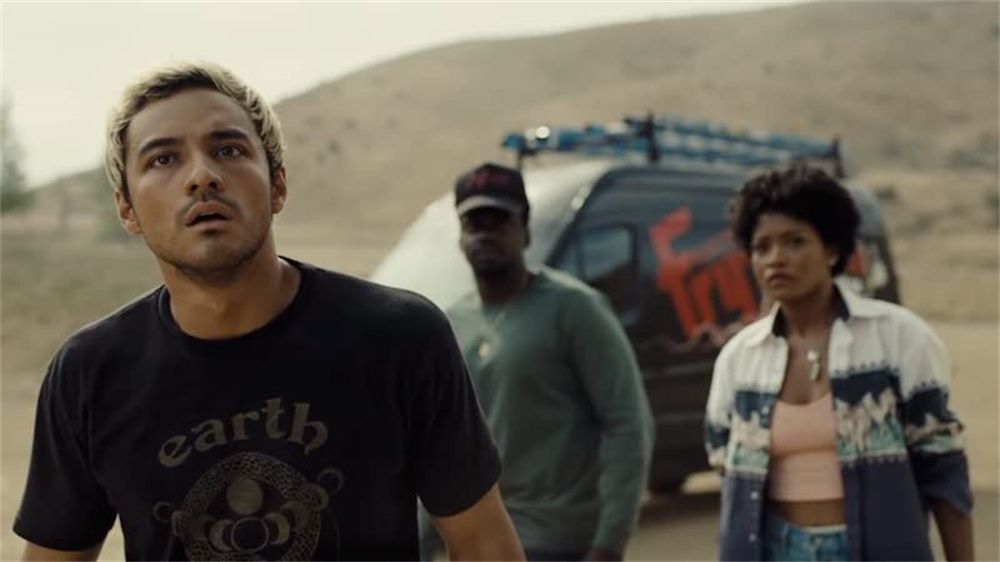
"No" stills
An allegory about the ills of modern people, a classic adventure film combination in which four people with different goals work together to accomplish a great cause, there is no guarantee that "No" will become a work with an aftertaste.
It is the scenery of the west. Due to the epidemic, the scale of group performances and set-ups has been greatly reduced, the final apostle-like transformation of alien creatures is magnificent and fragile, Daniel Kaluuya's animal-like shining and melancholy eyes and the soundtrack of the Western film, together. Brings melancholy color to the film.
There are also several protagonists who are Hollywood Lost. After the death of their father, the Haywood brothers and sisters, as the descendants of pure-blooded "Hollywood aristocrats", are about to become the last grandson, and can only barely make a living on the farm by selling horses. Angel's girlfriend dumps him and is with someone who can help her fulfill her dream of being an actress. The accomplished Horst watched over and over again the images of the past, the beautiful light and shadow formed by the plants in the garden, he turned a blind eye, trying to find meaning in the visual wonder.
When the four of them had a battle meeting, Angel asked: "Besides bringing us money and fame, is there any higher meaning to photograph it?"
Although we often tell ourselves, just do it, don't think about the meaning. But it's hard to really devote yourself to doing something without thinking about the meaning, because it goes against the human nature that is always full of near and far-sightedness.
After the decision to photograph the alien creature was made, a higher meaning was still missing for the quartet. But time was running out and they got into action right away.
Jordan Peele's approach to the dead in this film is subtle.
As I said before, he wasn't just sarcastic about Ricky. When Ricky dropped his hat before his death and looked up at the sky with a funny hairstyle, there was respect in the camera, expressing the director's complex emotions for all greedy and brave adventurers. A photographer who sent himself into the belly of a monster as a martyr of visual spectacle, his expression before his death resembled the ecstasy of believers in a painting. Although it should be very sacred, the black clothes are fluttering, but it is also a bit funny.
The quartet had no meaning at first, only definite goals. Meaning emerges on its own in action. Although the director mocked the modern people's obsession with visual spectacle, to the point that he himself became its slave without knowing it. But the group of four did not change their original intentions, deviating from the battle plan, and instead pursued a higher meaning. They work together to complete the visual wonder with alien creatures under the watch of the camera.
In the process, there are people who develop religious feelings and voluntarily give their lives. Some people become more and more courageous and become a rare black heroine riding a motorcycle in film history. The so-called meaning is gradually emerging.
Why is the quartet doing the same thing as everyone else—exchanging the wonders they filmed for what they need, but they won the director’s respect and didn’t become a clown? Because they are not fearless adventurers like Ricky after all. They have a modern world view, but with the blood of cowboys; they will be scared to flee for their lives, and they also fight like gods with forces much stronger than themselves.
The fighting process they go all out is a respect for their opponents. The insistence on not using horses as bait is a respect for horses as human companions. The cinematographer used an old-fashioned hand-cranked camera without electricity, a tribute to the traditions of the film industry. The setting of power outages wherever alien creatures go, points to the energy anxiety sweeping across humanity today, and pays homage to fighting superpowers with bare hands (rather than relying on a modern military).
Look, we the audience are so good at it. Just now, under the guidance of the director, I started to reflect on myself. In the blink of an eye, I forgot everything after appreciating the adrenaline-rushing battle scene. I applauded for them, hoping for a happy ending and changing the fate of the characters in one fell swoop. We, like Xiao Fei, breathed a sigh of relief when we photographed Jean Jacket, as if completing an important life mission. Even if we actually know, a few photos can hardly change a person's destiny. But we really hope so, that's the power of visual spectacle. It is consumed, it consumes us, but it is still amazing.


